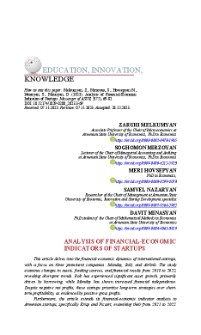Object
Title: Analysis of Financial-Economic Indicators of Startups
Creator:
Melkumyan, Zaruhi ; Mirzoyan, Soghomon ; Hovsepyan, Meri ; Nazaryan, Samvel ; Minasyan, Davit
Type:
Publication Details:
Journal or Publication Title:
Date of publication:
Number:
ISSN:
Official URL:
Coverage:
Abstract:
This article delves into the financial-economic dynamics of international startups, with a focus on three prominent companies: Monday, Bolt, and Airbnb. The study examines changes in assets, funding sources, and financial results from 2018 to 2022, revealing divergent trends. Bolt has experienced significant asset growth, primarily driven by borrowing, while Monday has shown increased financial independence. Despite negative net profits, these startups prioritize long-term strategies over short-term profitability, as evidenced by positive gross profits. Furthermore, the article extends its financial-economic indicator analysis to Armenian startups, specifically Krisp and Picsart, examining their from 2021 to 2022.
Krisp has demonstrated a reduction in assets alongside a decrease in liabilities, leading to improved financial independence. In contrast, Picsart has exhibited asset growth driven by internal resources, resulting in enhanced return on assets. Overall, this research highlights that startups strategically invest in expansion, anticipating long-term gains and increased market share value, despite short-term losses. The findings provide valuable insights into the financial dynamics
Place of publishing:
Երևան
Publisher:
Format:
Identifier:
oai:arar.sci.am:369479
Language:
General note:
Նյութը վերցված է Հայաստանի պետական տնտեսագիտական համալսարանի կայքից։
Object collections:
Last modified:
Jan 31, 2025
In our library since:
Feb 6, 2024
Number of object content hits:
75
All available object's versions:
https://arar.sci.am/publication/399253
Show description in RDF format:
Show description in OAI-PMH format:
-
Բանբեր Հայաստանի պետական տնտեսագիտական համալսարանի=Вестник Армянского государственного экономического университета=Messenger of Armenian State University of Economics
-
Բանբեր ՀՊՏՀ, 2011
-
Բանբեր ՀՊՏՀ, 2012
-
Բանբեր ՀՊՏՀ, 2013
-
Բանբեր ՀՊՏՀ, 2014
-
Բանբեր ՀՊՏՀ, 2015
-
Բանբեր ՀՊՏՀ, 2016
-
Բանբեր ՀՊՏՀ, 2017
-
Բանբեր ՀՊՏՀ, 2018
-
Բանբեր ՀՊՏՀ, 2019
-
Բանբեր ՀՊՏՀ, 2020
-
Բանբեր ՀՊՏՀ, 2021
-
Messenger of ASUE, 2022
-
Messenger of ASUE, 2023
-
Messenger of ASUE, 2023, 1
-
Messenger of ASUE, 2023, 2
-
Messenger of ASUE, 2023, 3
- Contents
- Economic Value Added (EVA) And its Calculation Features in Banks
- The Impact of Fed’s Monetary Policy on the Capital Market in the USA
- Some Issues of Middle-Class Formation in the Republic of Armenia
- Assessment of Disproportionate Territorial Development Based on the Example of the Republic of Armenia
- The Importance of Drug Safety and the Strategies for Promoting it
- Analysis of Financial-Economic Indicators of Startups
- A Comprehensive Analysis of Armenia's Innovation Input and Output
- The Impact of Global and Regional Crises on the Economy of the Republic of Armenia։ Quantitative Evaluation
- Analysis of Global Startup Market
- List Of The Publications Of “Messenger Of Armenian State University Of Economics” In 2023
- Editorial
- Author guidelines
-
Messenger of ASUE, 2023, 1
-
Messenger of ASUE, 2024
-
Messenger of ASUE, 2025
-
Բանբեր ՀՊՏՀ, 2011
| Edition name | Date |
|---|---|
| Melkumyan, Zaruhi, Analysis of Financial-Economic Indicators of Startups | Jan 31, 2025 |





